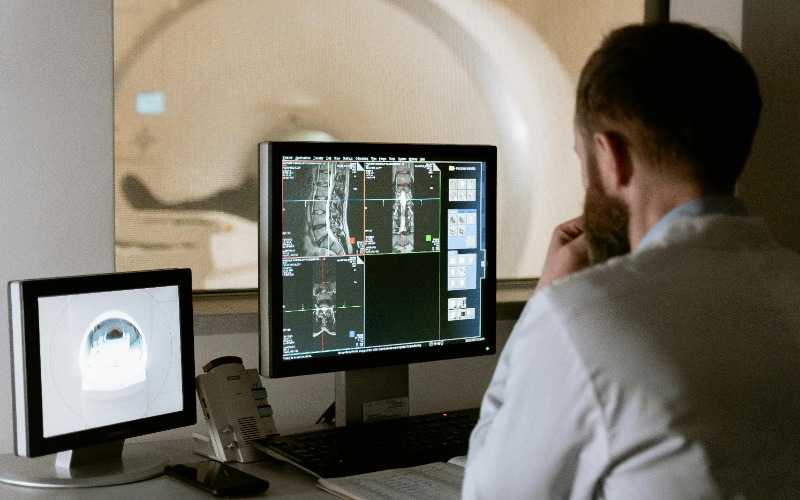The COVID-19 pandemic accelerated the need for and application of digital technologies to help deliver healthcare services, predict, and track the spread of the virus, provide researchers with access to real-world evidence, and facilitate vaccine development. Today, many of these tools, as well as other groundbreaking technologies, are being applied to clinical trials, which are the cornerstone for the development and evaluation of new medical treatments, drugs, and interventions. Digital apps, sensor-embedded devices, wearable technologies, and data acquisition platforms allow researchers to collect and analyze real-world data from clinical trial participants in real-time. This transforms how clinical trials and medical research are conducted, significantly improving their efficiency, accuracy, and impact on healthcare outcomes.
Digital innovation also improves the screening and recruitment of clinical trial participants, strengthens the inclusivity of clinical research, reduces timelines, facilitates remote participation, and enables new ways of collecting and sharing data. These enhancements in the clinical trial process can lead to advancements in treatments and therapies, safer and more effective new medications, and improved patient outcomes.
The Advantages of Digital Health Technologies in Clinical Trials
Traditionally, data was collected from clinical trial participants in a clinical setting, by handwritten or computer journals, and at scheduled intervals. Digital devices and wearable sensors have revolutionized researchers’ abilities to measure, collect, and store biological, behavioral, and physiological information, leading researchers to coin the term digital biomarkers. These digital biomarkers, which provide critical data for researchers, play an important role in determining individual patient health status and drug development.
Digital health technologies (DHTs), such as wearable devices, are beneficial in clinical research thanks to their ability to collect more meaningful, objective, continuous, and real-time data that reflects participants’ real-world experiences. While traditional clinical trials were conducted in a single physical setting, DHTs have enabled decentralized clinical trials (DCTs), in which some or all of the activities take place at alternate locations, including the participant’s home, local laboratory, or health facility. During DCTs, sensors capture information during a patient’s routine, providing researchers with insight into the effectiveness and safety of the treatment in daily life. Better real-world data collection means more accurate measurements and a comprehensive picture of a patient’s overall health. DHTs also enhance the inclusivity of clinical research, ensuring that underserved populations can participate in and benefit from medical advancements. Moreover, they reduce reliance on patients’ self-reported information and capture variations and trends that might have been missed in scheduled measurements.

DHTs can be used to measure numerous biomarkers and conditions. For example, ambulatory blood pressure monitoring provides data to determine an investigational new drug’s effects. An actigraph, which measures an individual’s movements (activity), rest, and sleep, helps monitor sleep patterns and facilitates the development of sleep disorder therapeutics. Polysomnograms are used in sleep studies to measure the signals from brain activity to diagnose and monitor sleep disorders such as insomnia, narcolepsy cataplexy syndrome, obstructive sleep apnea, circadian rhythm sleep disorders, and parasomnias such as sleepwalking, night terrors, and even sleep-related eating disorders.
DHTs offer many potential benefits in the innovation and development of medical products, including drugs. DHTs provide comprehensive data and insights into the progression of symptoms to improve clinical care and scientific understanding of various diseases such as Parkinson’s, dementia, Alzheimer’s, epilepsy, and other nervous system disorders. These technologies offer invaluable assistance by facilitating early detection, monitoring disease progression, and aiding in accurate diagnosis, thus enabling timely intervention and management of these complex neurological conditions.
With the aid of artificial intelligence (AI) and machine learning (ML), statistical analysts can classify, sort, curate, and store the massive amounts of data collected through DHTs—rapidly and at scale. AI and ML help analysts leverage huge volumes of data to identify patterns and predict outcomes. For example, statistical analysts can create models that interpret and evaluate data collected from DHTs to pinpoint the meaningful differences between an investigational new drug and an active placebo regarding safety and efficacy. Their unique insights and predictions will lead to advancements in medical research and therapeutics that are safer, more effective, and evidence-based.
Indeed, researchers and data analysts face several challenges and limitations, such as data privacy concerns, regulatory hurdles, legislative issues, communication compatibility, technological barriers, and disparities in digital technology access. Despite the challenges, researchers see the opportunities in DHTs for “improving healthcare delivery, remote patient monitoring, increasing access to medical services, and reducing healthcare costs. They also offer the potential for improved patient outcomes by enabling early detection and intervention in medical conditions.”
Medical Breakthroughs and Better Patient Outcomes
Advances in DHTs offer promising benefits in the development of drugs and treatments for undiagnosed diseases, including neurological disorders, which are often considered underfunded and under-researched in the medical community. Using DHT provides better data collection on conditions such as epilepsy, multiple sclerosis, Alzheimer’s, and Parkinson’s disease. Patients suffering from these and other neurological disorders face high healthcare costs and high rates of disability worldwide. According to a 2023 study, “the use of digital tools, such as connected sensors, promises to make research more patient-centered and move clinical trials beyond single “snapshots” of disease status toward more continuous measurement of these and other chronic disorders. The accumulation of better real-world data using DHT’s can “facilitate new study designs, improve the efficiency of clinical trials, and contribute to tackling many of the challenges neurological research faces.”
In one analysis, researchers gathered previously inaccessible data such as “repetitive cognitive testing, speech characterization, or swallowing monitoring” via DHT. The hope is that this data can lead to new medical breakthroughs and treatments for these debilitating disorders. The Japan-based company Takeda is working to bring digital monitoring technologies to patients with Parkinson’s disease. Takeda created an integrated care solution called Care for One, in which patients with Parkinson’s disease can use an app on their Apple Watch 1 to continuously monitor symptoms, capture movement, and collect data. Patients can also enter additional medical information into the app and send comprehensive data directly to their doctor’s computer.
The Future of Digital Tech in Healthcare
There is evidence that the use of DHTs will continue to expand globally. Forecasted trends show that the digital health market is expected to grow at a compound annual growth rate (CAGR) of 18.6 percent from 2023 to 2030. DHTs make gathering real-world data more accessible and efficient for medical researchers. The technologies enhance clinical trial recruitment, diversify participant demographics, improve retention and compliance, reduce costs, and enhance data collection, management, quality, and analysis. Digital technologies also assist in analyzing patient data, identifying patterns, predicting outcomes, and advancing new perspectives regarding personalized medicine.
This evolution is critical to addressing the complexities of precision medicine, drug development, and modern healthcare delivery. AI, ML, and other emerging technologies will continue to accelerate the digitization of clinical trials, leading to an increased data-driven approach to study design and implementation. As clinical trials and healthcare become more digitized and patient-centric, they will blend seamlessly to create a holistic journey that maximizes the benefits of medical advancement for the medical industry and patients alike.










